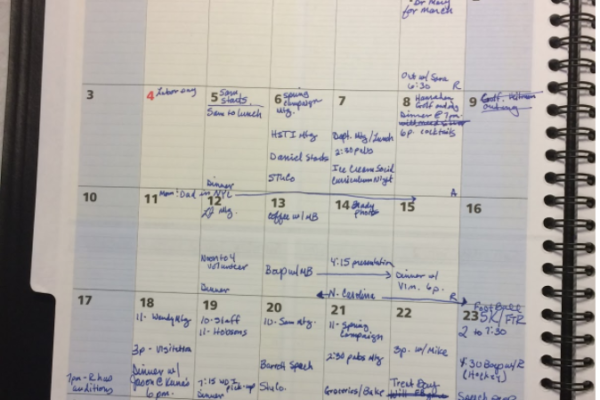Amy Calhoun’s session description was certainly intriguing – save enough time to take Fridays off? Yes, please!
Amy introduced her talk with this video:
Amy’s first bit of advice was to take the word “busy” out of our conversations.
“To me, busy implies that the person is out of control of his life.”
– Derek Sivers, entrepreneur, TED speaker, musician, producer, circus performer and book publisher
She then suggested that we look at how we were spending our time during the week – we all have the same 168 hours, so how are you spending it? Are you being intentional in your time or are you letting your apps control you?
When Amy first started down this path, she tracked her time for a week and learned two major things:
- She wasn’t any different from the average American, spending an average of 2 hours and 58 minutes on their phone every day.
- She would procrastinate, even though the jobs/tasks she needed to complete would only end up taking 30 minutes to complete.
Why do we procrastinate?
Amy found the answer to this question in Solving the Procrastination Puzzle: A Concise Guide to Strategies for Change by Tim Pychyl:
- It’s boring
- It’s difficult
- It’s frustrating
- It’s unstructured
- It lacks meaning
- We don’t know how or where to start
Amy’s next suggestions were about how to combat your procrastination and spend your time wisely. She suggested four types of review: quarterly, monthly, weekly and daily.
The quarterly review has three questions:
- What are my major projects and goals?
- Whom do I want to build a partnership with?
- What discoveries am I going to make?
She suggests writing these out by hand in a loose-leaf binder, and at the end of the quarter, you can review them.

Next, do a monthly review. Amy “syncs up” her work, family and personal calendar on a planner. This helps her look at the whole month and move appointments if something conflicts.
A weekly review allows you not only to revisit your appointments for the week but will allow you block off any remaining open time for yourself. At this point, if someone hasn’t requested a meeting with you, Amy suggests they don’t get on your calendar for that week.
For daily reviews, be intentional with your time. Plan to accomplish only a small number of tasks, and add more after you complete those. Ask for help. Don’t spend time struggling on an aspect that is not one of your strengths when you could easily ask for help from a colleague. The last tip in your daily review and in planning your day is to treat each day like you are going on vacation tomorrow.
After you have organized your time, you have saved enough time to take Fridays “off.” Amy still is present at work on Fridays, but uses Fridays to read articles regarding the work she does, building the partnerships she listed as goals in her quarterly review, working on professional development, listening to podcasts and whatever else would help her “fill her tank back up.”
Amy invites all the attendees, and anyone reading this, to join a special Facebook group, Get More Done. In this group, we can continue to work together and share tips to do just that.
Amy’s parting words to the group I’ve tried to keep with me since her presentation: Put your phone down, be intentional and make room for the rocks in your jar.

